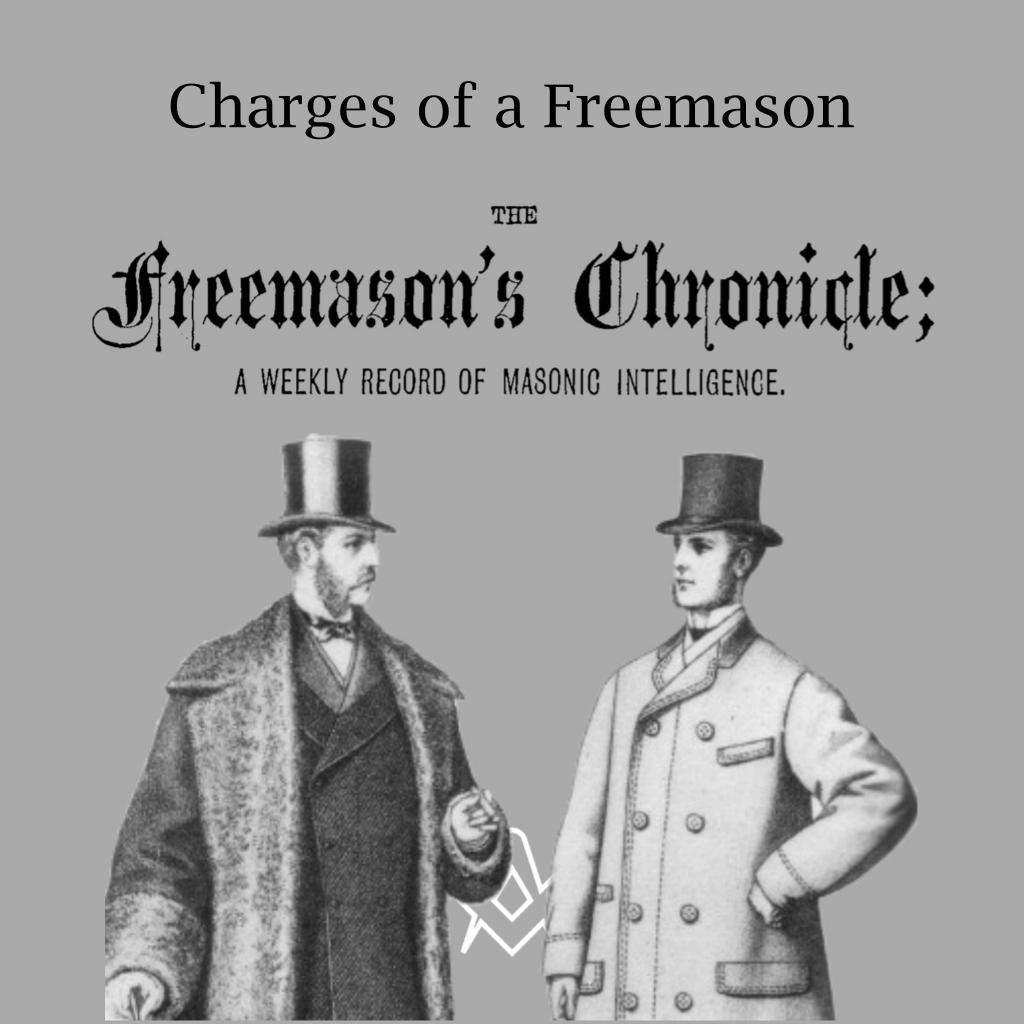Mere seniority of years will not make up for a deficiency in essential qualities. It is safer, however, to select those who are mature in age, than the young and necessarily inexperienced.
Wisdom and knowledge are more likely to dwell with grey hairs; but they alone are not sufficient.
Seniority should not be the standard, but qualifications; and while these are more frequently the heritage of years, the industrious and studious youth may have acquired a fitness which age has not gained.
– Bro. Cornelius Moore, Editor of the Masonic Review (1875)
An interpretation of the “Charges of a Freemason”, written Bro. Cornelius Moore and published in 1875, that introduce certain opinions that for some readers, will not sit well in contemporary times.
– Publisher
The writer of this, totally unexpected to himself, was elected and installed Master of his Lodge in less than a year after his initiation.
This was evidently in violation of a venerable law, which requires one to have served as Warden before he shall be eligible to the office of Master: but it was at a time when those laws were not well understood or very strictly obeyed.
Besides this, it was an experiment that should very rarely be tried, for he was evidently unfit to perform the duties of that office—not having had sufficient time to acquire the requisite knowledge or experience.
But while youth should sit at the feet of age, and learn wisdom from the lips of experience, qualifications, and not seniority, should be the passport to promotion and honour.
The great reason for this rule of preferment is,
“that the lords may be well served.”
This was the rule when Masonry -was exclusively operative in its character; and it is still a good rule in speculative Masonry.
“The lords” were then ” well served, ” when the buildings on which the Craft were engaged were skilfully and tastefully erected; when the material was well selected and accurately prepared, and the several portions properly adjusted in the building.
Now the work is well done when the moral precepts of the Order are wisely and impressively taught, and the moral structure so reared that the supreme Grand Master will be” well served, ” and the temples built such as will meet his approbation.
The “mode and manner” of acquiring knowledge, such as will prepare a Mason for eminence among his brethren, cannot be ” described in writing; ” they depend upon the listening ear, the instructive tongue, and the faithful breast.
The rituals of Masonry can only be acquired by diligent attention, oral instruction, and long experience. They can be learned nowhere but in the Lodge room, for the illustrations can be witnessed nowhere else.
“Every brother must attend in his place, and learn them in a way peculiar to this Paternity.”
The Lodge is the school room of the Masonic student; and while he may learn much from a constant study of the written charges and constitutional rules of the Order, as well as by “a diligent perusal of the Holy Scriptures—the great Light in Masonry,” and its moral trestle-hoard — yet, the illustration and application, which are absolutely essential, can only be found in the tiled recesses of the Lodge room.
No Mason should fail to attend the meetings of his Lodge unless a higher duty interpose. This rule was important when the Craft was engaged in building. If there were more Craftsmen than there was work to do, some of them must be unemployed.
And, having no other resources for a livelihood, must become a charge upon the brethren. The supply would be greater than the demand, and the evils resulting from this state of things would be serious.
Hence the wisdom of this injunction, —not to” take an apprentice unless ” there was” employment for him” -to instruct. no more in the art than would be sufficient to perform the amount, of work to be done. Persons should not be admitted to the Order merely to enjoy its benefits, for no mercenary motives should dictate their petition.
“A desire for knowledge, and a sincere wish to be of service to his fellow creatures,” should be his plea at the door of the Lodge.
He should not come to share the honours or the benefits of Masonry so much as the faithful labours of the Craft, and their legitimate rewards. “It is more blessed to give than to receive.”
It is more blessed to give than to receive
A candidate for Masonry must be physically perfect. As, under the Jewish economy, no person who was maimed or defective in his physical organism, through of the tribe of Aaron, could enter upon the office of a priest, nor a physically defective animal be offered in sacrifice, so no man who is not ” perfect ” in his bodily organisation can legally be made a Mason.
We have occasionally met with men having but one arm or one leg, who in that condition had been made Masons; and on one or two occasions we have found those who were totally blind who had been admitted!
This is so entirely illegal so utterly at variance with a law which every Mason is bound to obey —that it seems almost incredible, yet it is true.
If a man cannot see, how can he “learn the art” which is taught, which in a great measure, by ocular illustration ?
If he cannot see, how can he recognise a call of distress which is addressed only to the sight ?
If his right arm be wanting how is he to discharge those peculiar duties which devolve upon him in the Lodge room, or in his intercourse with the Craft ?
So, also, if he be deprived of a leg or foot ?
It is impossible to explain, fully, the reason for this necessity for physical perfection, but the intelligent Mason will readily understand, by recurring to the duties and ceremonies, from a participation in which no one is exempt.
“A candidate must be perfect, having no maim or defect in his body.” This is plain, positive, and admits of neither question nor cavil.
He must be perfect to enable him to ” learn the art, ” to ” serve his Master and ” be made a brother.” He will be utterly incapable of any of these if he should be deprived of any of his limbs or his senses.
Hearing, seeing, feeling—all are equally essential. But he must be perfect to enable him to work as a Fellow Craft; to examine and adjust the work, and see that it is well and accurately finished. If he cannot do the work himself, he cannot tell whether it is done well by others.
Every person made a Mason should have the physical qualifications to discharge any duty required of him as a Mason, or to fill any office to which he may be called.
“Term of years. ” —In earlier days a much longer novitiate was required than now. The great truths and duties of Masonry were not learned in a few weeks, or even months; it required years.
And even now, in some portions of Europe, the rule is—one degree a year, until symbolic Masonry be passed, at least. One great evil now prevalent among the Craft in the United States is, that degrees are too rapidly conferred.
No man can be a proficient in the knowledge of ancient Craft Masonry in less than one year, and very few will be in five. Yet how often we see him passing through a degree each month, when it is utterly impossible, in that length of time, for him to have made a “suitable proficiency” in understanding the degree already received.
Perhaps in six months he is in the [Royal Arch] Chapter, and by the close of the year, has become a Royal and Select Master, and even a Knight of Malta !
This is a work which should have occupied at least five years; and yet it has been accomplished in little more than twice that number of months. By this haste a two-fold injustice is done : first, to the candidate, and, secondly, to the Craft.
“It should be a rule of act ‘ on, in the admission of new members, never to admit one, who, from any defect in body, mind, or moral qualities is not entirely eligible to the discharge of any duty, or to fill any office to which the Order may call him.”
The rule before us requires, among other qualities, that he should “be descended of honest parents”— that is, that he should have been born in lawful wedlock.
It was a universal rule, and is still preserved in some Grand Lodge jurisdictions, that an illegitimate could not ho made a Mason.
One reason for this, in the olden days, was the prevalence of the laws of primogeniture, which deprived the illegitimate of many rights and privileges; it may also have been borrowed from the Jewish Laws, which, in cases of illegitimacy, visited the “sins of the father upon the children.”
But from whatever source it was borrowed, it is clear from the text that the “fruits of illicit love” were excluded from the tights and privileges of Masonry. We live too far from the times in which this law was enacted, to judge of its propriety.
Masonry was, undoubtedly, then, as now, influenced a little by the laws and customs of society: hence we are not capable at this day, in this country of different laws and usages, properly to appreciate the reasons for excluding the class of persons referred to.
That they were excluded, is perfectly clear from the text; and the principal reason then given for excluding them, is by implication, that such persons were ineligible to the various offices of honour and responsibility in the Craft.
They could not be Warden, Master, or Grand Master; therefore, they should not be admitted. It may have been a mere [local rule] prohibition, and ceased to be operative when the usages from which it was borrowed passed away .
Degrees were not conferred so rapidly in former times as now. The first degree was always conferred by the particular Lodge to which the application was made; but the degrees of Fellow Craft and Master Mason were only conferred by the Grand Lodge or General Assembly.
Hence it might be one, two, three, or half a dozen years, before an Entered Apprentice could reach the degree of Master: and many, it is most likely, never received it.
These degrees were distinctions, not conferred as a matter of course upon ovary one who was initiated, but after long probation, and as a reward of singular merit.
An Entered Apprentice was regarded as a Mason, and entitled to all the ordinary rights and privileges of the Order, even to the attendance upon Grand Lodge, and voting there on great questions affecting the interests of the whole body.
If after a reasonable time ho became distinguished as an artisan, and proved himself worthy, he was advanced to the degree of a Fellow Craft.
After having received this degree, he could act as Warden of a Lodge; indeed, it would seem, from the language of the text, that he not only received the Fellow Craft degree as a reward for his industry and skill, but with a view to his eligibility to the position of Warden.
After he had performed the duties of a Warden, and proved himself worthy as a Fellow Craft, he was rewarded with the sublime degree of Master, and could then legally preside over a Lodge.
He could not be a Grand Warden unless he had before that been a Fellow Craft; his having previously received this degree was the evidence which was required by the Craft to show that he was worthy and competent.
But to be a Grand Warden another qualification was necessary; he must be a distinguished man, as well as a skilful Mason.
He must be either “nobly born,” a gentleman of “the best fashion,” an ” eliminant scholar, curious architect, or other artist, descended of honest parents,” and be “of singular great merit in the opinion of the Lodges,”
These provisions speak for themselves, and need no comment or explanation. The times and the condition of society seemed to require that someone distinguished in the community should be at the head of the Craft.
If there was a member of the Royal family belonging to the Order, and he would consent to serve, he was always selected as Grand Master, while a nobleman, or some distinguished scholar or artist, served as Warden.
If there were none of royal blood, then men of less note were selected, such for example, as was Inigo Jones, Sir Christopher Wren, and others, the ablest architects of their times.
But the altered condition of society has rendered these precautions unnecessary; and in this free country, where all are noble born, personal merit has very properly become the only passport to honour and distinction.
It seems to have been the prerogative of the Grand Master, in ancient times, to select and appoint his own Deputy, but was limited in his selection to those who had served as Masters in subordinate Lodges.
We are clearly of the opinion that the Grand Lodges of modern days have, in providing for the election of Deputy Grand Masters, departed from ancient usage.
It would appear that, then, the Deputy had no power to act except as he was directed by the Grand Master, and that the duty he discharged became the act of the Grand Master, —for it was done in his name and by his command, and he was responsible for it.
As at present arranged, there are in effect two Grand Masters in the same jurisdiction; for the Deputy can, on his own responsibility, do almost anything which the Grand Master can, except take precedence in Grand Lodge.
He can grant dispensations, arrest charters, etc ., etc ., without consultation with the Grand Master, even while the latter officer is within his jurisdiction.
This is generally the case, although some Grand Lodges restrict the Deputy to a narrower sphere of action.
Notwithstanding it may be in the power of the Grand Lodge to confer upon the Deputy, in many things, equal power with the Grand Master, yet we are inclined to think the former practice the best; he should be the Deputy of the Grand Master, and not of the Grand Lodge, and should only act when directed by his superior officer, and in his name.
If the Grand Master should die, or remove out of the jurisdiction of the Grand Lodge before the expiration of his term of service, of course the Deputy will succeed to his place, and discharge all his duties until a new Grand Master is elected, unless the regulations provide differently.
In every department of Masonry, obedience to superiors is absolutely necessary; not the obedience of the slave, but of the subject or citizen—an obedience springing from principle and reverence for law.
Order must reign in all departments of the mystic temple; the officers, supreme and subordinate, are entitled to respect, and the Craft should render to their lawful commands a prompt and willing obedience.
According to the rules laid clown in this Charge, great care has been taken to secure worthy, competent, and judicious officers—men selected for their merit and skill in the Royal Art-men fully competent to govern; and they should be obeyed with “reverence, love and alacrity.”
It is true that when a man is promoted to office he is not thereby rendered infallible; but we have a right to presume that he exercises his best judgment; and should he err, obedience for the time being would be a less evil than discord and rebellion.
The error can be remedied in the next Grand Lodge, but rebellion strikes at the foundation of all order and all government .
Of the management of the Craft when working. —All Masons shall work honestly on working days, that they may live, creditably on holy days; and the time appointed by the law of the land, or confirmed by custom, shall be observed.
The most expert of the Fellow Craftsmen shall be chosen or appointed the Master, or Overseer of the lord’s work, who is to be called Master by those who work under him.
The Craftsmen are to avoid all ill language, and to call each other by no disobliging name, but brother or fellow; and to behave themselves courteously within and without the Lodge.
The Master, knowing himself to be able of cunning, shall undertake the lord’s work as reasonably as possible, and truly dispend his goods as if they were his own; nor to give more wages to any brother or apprentice than he really may deserve.
Both the Master and the Masons, receiving their wages justly, shall be faithful to the lord, and honestly finish their work, whether task or journey; nor put the work to task that hath been accustomed to journey.
None shall discover envy at the prosperity of a brother, nor supplant him or put him out of his work, if ho be capable to finish the same; for no man can finish another’s work so much to the lord’s profit, unless he be thoroughly acquainted with the designs and drafts of him that began it .
When a Fellow Craftsman is chosen Warden of the work under the Master, he shall be true both to Master and Follows, shall carefully oversee the work in the Master’s absence to the lord’s profit, and his brethren shall obey him.
All Masons employed shall meekly receive their wages, without murmuring or mutiny, and not desert the Master, till the work is finished.
A younger brother shall be instructed in working, to prevent spoiling the materials for want of judgment, and for increasing and continuing of brotherly love.
All the tools used in working shall be approved by the Grand Lodge.
No labourer shall be employed in the proper work of Masonry; nor shall Freemasons work with those that are not free, without an urgent necessity; nor shall they teach labourers and unaccepted Mason as they would teach a brother or fellow.
Masonic tradition informs us, and it is confirmed by the great Light which shines from the altar of every Lodge, that Masons in ancient times devoted six days to labour, but the seventh was devoted to rest, to the solemn worship of God, and the contemplation of his glorious works.
By the term “holy days,” in the text, is meant the days set apart as Sabbaths.
To “live creditably,” on the Sabbath, is therefore to rest on that day from ordinary labour, and devote it to the worship of the Infinite One, to the contemplation of his sublime works in nature and Revelation, and to yielding our homage and our hearts to him.
This is to live “creditably” on that day, according to Masonic law and usage. But in order that we may devote the seventh, or “holy” day to this purpose, we must work on the other six days; and it should be remembered that it is just an obligatory upon Masons to devote the six days to labour, as the seventh one, to rest; and no Mason can violate either duty without forfeiting his moral integrity and fixing a stain upon his Masonic character.
It is worthy of observation that this, the highest Masonic law, does not fix the day which shall be set apart as “holy;” it does not name the “seventh” day of the Jews, nor the “first” day of the Christians; but the one “appointed by the law of the land, or confirmed by custom” of the country.
In Christian countries, the “first day of the week, ” is set apart by law and custom both, as the day of rest – the Sabbath. If the Jews had a country under their own laws, the “seventh day” would be the “holy day.”
Masons should, therefore, in obedience to the law in the text, observe the day appointed by the laws of the nation in which they reside.
They cannot be good, obedient, law abiding citizens or subjects unless they do. It should also be remembered that this is not merely advisory; “All Masons shall,” is the imperative language of the text. In this paragraph the principle of personal merit is again recognised.
We have already seen that promotion among the Craft is to be regulated by this principle; and here it is repeated and confirmed.
“The most expert of the Fellow Craftsmen “— those who have made the greatest proficiency in the art—are to be selected to fill the office of Master; the degree of Master Mason was then probably conferred upon him, and he was duly installed as “overseer of the lord’s work,” and was to be recognised and respected as such by those that work under him.
This paragraph not only requires the Craft to be respectful to the Master, but to be courteous to each other.
They are to use no ill language; their passions are to be controlled and kept within the boundary prescribed by the compasses; they are to be kind, respectful, and agreeable to one another, and to call each other brother, or by some other fraternal designation.
Masonry requires its members to be gentlemen— respectful, courteous, kindly: rough, uncouth, and boorish habits are to be laid aside—must be—under the refining and elevating social influence of our venerable association.
This was especially applicable when the Craft were yet engaged in operative Masonry. The Master was then not only the overseer of the work, but also the agent or steward of the “lord,” or proprietor of the building.
Honesty was a virtue particularly important in the Master; for, while he was required not to “give more wages to any brother or apprentice than ho really deserved,” he must, at the same time, have such a knowledge of the business as to enable him to do the work for a fair and reasonable price.
He stands between the proprietor and the workmen, and must do justice to both: justice is one of the cardinal virtues, and must be constantly cherished by everyone who would be a very consistent Mason or an honourable man .
 The Freemasons Chronicle, a weekly record of masonic intelligence, was first published 2nd January 1875 London, England as an independent weekly journal of masonic interest and continued for 27 years.
The Freemasons Chronicle, a weekly record of masonic intelligence, was first published 2nd January 1875 London, England as an independent weekly journal of masonic interest and continued for 27 years.
It should be the business of a journal devoted to the interests of the Order to attempt the removal of prejudices such as these, which, though they may have little perceptible influence upon the prosperity of the Fraternity, yet have the effect of preventing timid or ill-informed persons from enlisting under its banner.
It will not only attempt to keep pace with the growing literary requirements of the day, but it will seek to exhibit the Order to the non-Masonic world divested of its technical details, and clothed in the garb of Charity and Brotherly Love.
The questions of the hour, which exercise the minds of thoughtful men, will be handled freely and broadly, without any tinge of political or sectarian bias.
The memoranda of Masonic gatherings which will appear from week to week, will be full and accurate; and as free interchange of opinion is one of the best signs of life and vigour in any society, ample scope will be given for Correspondence on topics of interest to the Order.
If we may venture upon a new rendering of words which recent events have made memorable, we will say here, once and for all, that we will be keen men of business, and will spare no effort, consistent with honour, to achieve commercial success; but first, and before all things, we will prove to our brethren and the world that we are FREEMASONS.
Recent Articles: The Freemason's Chronicle
 Operative And Speculative Masonry Explore the fascinating transition from Operative to Speculative Masonry in our latest post. Discover historical insights from Augustus C. L. Arnold and Rev. Wm. P. Strickland, shedding light on Freemasonry's evolution and its enduring principles. Dive into the rich history and significant milestones that shaped modern Freemasonry. - The Freemason's Chronicle - 2 September 1876 |
 Discover the true essence of Freemasonry, an ancient order founded on the profound principles of love for God and man. It's a call to rise above mere appearances, to embody genuine virtue and benevolence, transcending societal pretense. Embrace the transformative power of simplicity, and let the authentic glories of Freemasonry inspire your path. |
 Discover the intriguing story of a man who became a Mason but openly professed his dislike for the institution. Unravel the peculiar circumstances that led him down this path and explore the unexpected consequences that followed. Dive into this thought-provoking account that challenges our notions of loyalty and reveals the complexities of human nature within the Masonic fraternity. |
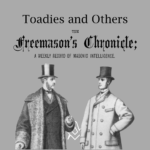 In the realm of Masonry, the principles of equality and respect are paramount. Yet, the presence of toadies—those who obsequiously seek favour from the influential—threatens these ideals. While Masonry embraces diverse beliefs and backgrounds, it rejects the sycophantic behaviours of toadies, flunkeys, and tuft-hunters, urging members to uphold genuine respect and self-worth. The Freemason's Chronicle - 22nd January 1876 |
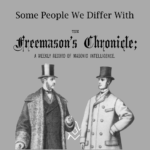 Unveiling the Unpleasant: Some People We Differ With Discover the intriguing dynamics of quarrels within the Masonic brotherhood. From the cantankerous to the litigious, the peevish to the vengeful, delve into the characters that challenge fraternal harmony. Explore their motives, temperaments, and the art of navigating disputes with these fascinating brethren. Brace yourself for a riveting journey into the world of conflicting personalities. |
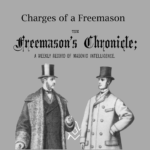 Unravelling the Masonic Mystique: A Deep Dive into the Freemasons' Charges - Explore the intricate world of Freemasonry, its principles, rituals, and the mechanisms for resolving internal disputes. Discover how this ancient fraternity fosters unity, promotes moral conduct, and upholds the sanctity of its secrets, while navigating the complexities of modern society. - The Freemason's Chronicle - 4 December 1875 |
 Unlock the hidden lessons of Masonic Studies! Don't settle for superficial knowledge or mere rituals. Discover the true depth and meaning behind Freemasonry. Expand your understanding of Tracing-Boards, Lectures, and more. Join regular Lodges of Instruction to enhance your Masonic journey. Become a knowledgeable Freemason, not just a token-bearer. Unleash the power of true Masonic wisdom today! |
 Uncover the incredible story of how Masonry saved the life of a Crimean War foot soldier in this historical and masonic account. Through the first hand experience of a soldier engaged in fierce hand-to-hand combat, witness the fateful encounter with a Russian Freemason that changed the course of his life. Learn how brotherhood and a deep dedication to the craft can lead to unforeseen and life-saving circumstances on the battlefield. |
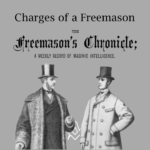 The Freemason's Chronicle - Charges of a Freemason The secrets of Masonry are the exclusive property of the Craft, and can never be communicated to one who is a mere labourer and not an accepted Mason. Hence, no labourer, that is, one who has not been regularly initiated in a legal Lodge. Article first published in The Freemason's Chronicle, 27 November 1875 |
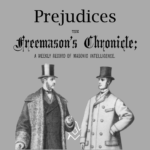 The Freemason's Chronicle - Prejudices Prejudices are partial judgments in favour of, or against certain persons or things, and, for convenience sake, may be ranged in two categories—those which are, comparatively speaking, harmless, and those which are harmful. Article first published in The Freemason's Chronicle, Oct. 2 1875. |
 The Freemason's Chronicle - Cliques Is Freemasonry - a Clique ? Man has been defined as a gregarious animal, but in his highly civilised condition he is gregarious only to a limited extent. First published in The Freemason's Chronicle, Oct. 2 1875, addresses the same challenges then as now. |
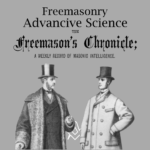 The Freemason's Chronicle - Freemasonry - an Advancive Science Is Freemasonry - an Advancive Science ? Not to confuse advancement with innovation. Has it been the case that Freemasonry's survival for 300 years plus is due to being an Advancive Science, tending to advance. First published in The Freemason's Chronicle 18 September 1875, addresses the same challenges then as now. |
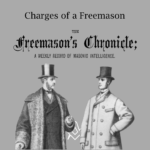 The Freemason's Chronicle - Charges Of A Freemason An interpretation of the "Charges of a Freemason", written Bro. Cornelius Moore and published in 1875, that introduce certain opinions that for some readers, will not sit well in contemporary times. - The Freemason's Chronicle, Sept. 11, 1875 |
 On The Order Of The Temple And Its Doctrine. THE Order of the Temple is divided into two great classes, denominated respectively the Order of the Temple and the Eastern Order. The Eastern Order gave birth to the Order of the Temple, and in the course of time has become an appendage of the latter. It is in ancient Egypt that we find the cradle of the Eastern Order. The Freemason's Chronicle, Sept. 4, 1875 |
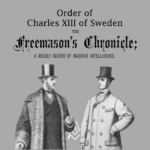 Order of Charles XIII of Sweden The following translation of the Manifesto of King JL Charles XIII of Sweden, on the occasion of his establishing the Masonic Order which bears his name, and of the Statutes of the said Order, may be interesting to our readers. The Freemason's Chronicle, Aug. 28, 1875 |
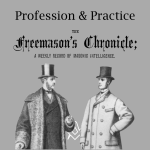 Most of our readers in the course of their experience, have doubtless met with enthusiastic brethren who take it for granted that a Mason can do no wrong. These enthusiasts are thoroughly convinced that the vast majority of those who join the Order are the most benevolent, the most moral, and the very noblest members of society. - The Freemason's Chronicle 10 July 1875 |
 An article investigating the relationship between masonry and citizenship. Are the principles of Freemasonry aligned with the freemason's claim to be a better citizen of the world? The Freemason's Chronicle - 19 June 1875 |
 A visitor must make clear his identity to the satisfaction of the Lodge he proposes to visit. More than once have we been asked to explain our views as to the reception of strangers in a Lodge. - The Freemason's Chronicle - 29 May 1875 |
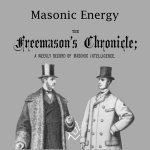 Is there reason in the accusation that Masonic energy looks only to a course of good feeds, when we can point to such grand results as have been achieved in these latter years, both in respect of the extension of our Order ? - 1May 1875 |
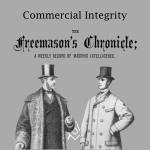 Implementing Freemasonry's peculiar system of morality in our day to day business affairs was the topic of this article, Commercial Integrity, first published in The Freemason's Chronicle - 8 May 1875 |
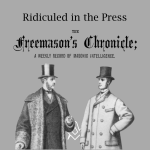 Ridicule has been somewhat illogically described as the test of truth. If it were so, Freemasonry ought to have perished long since. Two press reports from May 1875 covering the |
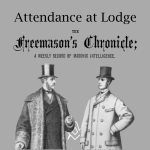 There are many things which Freemasonry will do for a man in the way of opening his mind and giving him larger and kindlier views of life, but Freemasonry itself, cannot eradicate the natural bias of the disposition. |
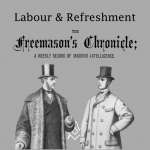 There is, we fear, too marked a tendency in very many Lodges to hasten through its labours, with a view to entering, as soon as possible, upon the business of refreshment. - The Freemason's Chronicle 17th April, 1875 |
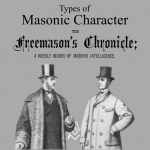 Another example that demonstrates that nothing really changes in Freemasonry. In an article the Types of Masonic Character published 145 years ago in The Freemason's Chronicle 10th April, 1875 |
 A brief history on the relationship between the British Monarchy and the craft - The Freemason's Chronicle 20th March , 1875 |
 What are the qualities of a convivial man and how does this dovetail perfectly in to Freemasonry ? 16th March, 1875 |
 A review of the "Sketch for the History of the Dionysian Artificers," a fragment, by Hyppoli to Joseph Da Costa - This little work may be regarded as, so to speak, the Holy Grail of Masonry. |
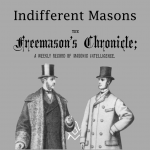 Nothing really changes, an article Indifferent Masons, From Le Monde Maçonnique 1874. Translation published in The Freemason's Chronicle 20th February, 1875 |
 In handling an intruder in the lodge, we endeavoured to show that a good Mason should be a gentleman, and a sincere man. The Freemason's Chronicle 20th February, 1875 |
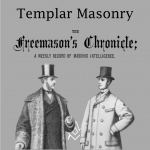 Templar Masonry - a historical aspect of the Religious and Military Order of the Temple published in The Freemason's Chronicle 13th February, 1875 |
 Secrecy perhaps the strongest objection urged by the enemies of the Masonic Order against its existence published in The Freemason's Chronicle 20th March 1875 |
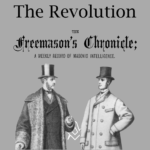 Freemasonry In The United States during And After The Revolution We take a look at Freemasonry in the United States during and after the Revolution first published in The Freemason's Chronicle - February 6, 1875 |
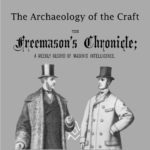 We take a look at the archaeological connection with the Craft, first published in The Freemason's Chronicle - January 30, 1875 |
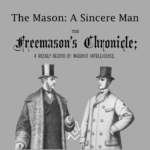 What it means to a Freemason to be a sincere man. Extract: first published in The Freemason's Chronicle - January 23, 1875 |
 What it means to a Freemason to be a citizen of the world ? First published in The Freemason's Chronicle - January 16, 1875 |
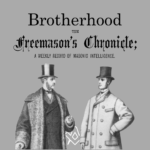 Brotherhood! In that one word what sympathetic associations arise. First published in The Freemason's Chronicle - January 9, 1875 |
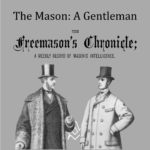 This opening article was written 145 years ago, yet it resonates with Freemasons today as it did then. First published in The Freemason's Chronicle, January 2, 1875, Issue 1 |
masonic knowledge
to be a better citizen of the world
share the square with two brothers

click image to open email app on mobile device


